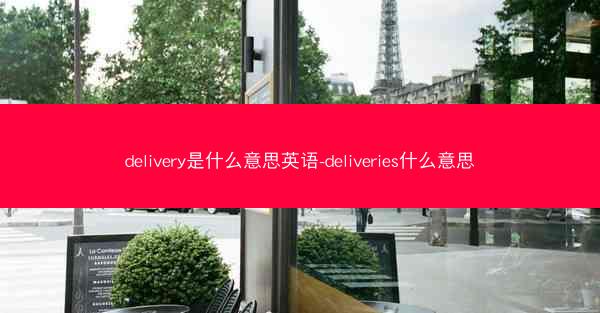delivery是什么意思英语-deliveries什么意思

Introduction to the Concept of Delivery
Delivery, in its simplest form, refers to the act of transporting goods or services from one place to another. It is a fundamental aspect of logistics and supply chain management, ensuring that products reach the intended recipients in a timely and efficient manner. Whether it's a package being delivered to a doorstep or a service being provided to a client, the concept of delivery is integral to the success of businesses and individuals alike.
Types of Delivery
1. Physical Delivery: This is the most common form of delivery, where tangible goods are transported from the point of origin to the final destination. It can be further categorized into several sub-types:
- Standard Delivery: This involves delivering goods within a specified timeframe, often without any additional costs.
- Express Delivery: A faster service that usually comes at a higher cost, ensuring quick delivery within a few hours or days.
- Same-Day Delivery: A premium service that guarantees delivery on the same day the order is placed.
2. Digital Delivery: In the digital age, delivery has expanded to include services beyond physical goods. This includes:
- Software Delivery: Distributing software applications or updates to users.
- Content Delivery: Providing digital content such as e-books, music, or videos to consumers.
- Service Delivery: Delivering services like online consultations, cloud computing, or remote assistance.
Importance of Delivery in Business
3. Customer Satisfaction: Efficient delivery is crucial for customer satisfaction. It ensures that customers receive their orders on time, which can lead to repeat business and positive word-of-mouth referrals.
4. Competitive Advantage: Offering reliable and timely delivery can differentiate a business from its competitors. It can be a key factor in attracting and retaining customers.
5. Cost Management: Effective delivery management can help businesses control costs associated with transportation, storage, and handling of goods.
Challenges in Delivery
6. Logistics Complexity: Coordinating the movement of goods from suppliers to manufacturers, warehouses, and finally to customers involves complex logistics. This includes managing routes, schedules, and inventory levels.
7. Environmental Concerns: The delivery process contributes to carbon emissions and environmental impact. Businesses are increasingly looking for sustainable delivery solutions to minimize their ecological footprint.
8. Security Risks: Delivering goods can expose businesses to risks such as theft, damage, or loss. Implementing secure delivery methods and tracking systems is essential to mitigate these risks.
Technological Advancements in Delivery
9. GPS and Tracking Systems: The use of GPS and real-time tracking systems has revolutionized delivery by providing accurate and up-to-date information on the location of goods.
10. Automation: Automation in delivery processes, such as the use of robots and drones, is becoming more prevalent, especially for last-mile delivery.
11. Blockchain Technology: Blockchain can enhance the transparency and security of delivery processes, ensuring that each step is recorded and verifiable.
The Future of Delivery
12. Innovation in Delivery Methods: The future of delivery is likely to see further innovation, including the use of autonomous vehicles, advanced robotics, and even space-based delivery systems.
13. Personalization: Delivery services may become more personalized, with options for customers to choose specific delivery times or even interact with delivery personnel.
14. Integration with E-commerce: As e-commerce continues to grow, delivery services will need to adapt to the changing demands of online shopping, including same-day and next-day delivery options.
15. Sustainability: With increasing environmental awareness, sustainable delivery practices will become more prevalent, driving the industry towards greener solutions.
In conclusion, delivery is a multifaceted concept that encompasses the transportation of goods and services. It plays a vital role in business operations, customer satisfaction, and environmental sustainability. As technology continues to evolve, the delivery industry is poised for significant changes, offering new opportunities and challenges for businesses and consumers alike.










